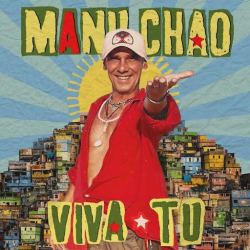Manu Chao’s Viva Tu Out Now (Because Music)

|
|
“Chao’s Holy grail is to write a song as universal in its simplicity and simple in its universality. And in Viva Tu, he might have done it, adding a shot of ever-present malegria into a hymn to self-acceptance” – Uncut
“An exciting new album” - NPR Music Alt.Latino
"He's still following his own path, sounding as fresh as he did more than 25 years ago" - Remezcla
"It's classic Manu Chao, tuneful, groovy, provocative and fun!" - Afropop
Listen to new album Viva Tu
Order new album Viva Tu
September 20, 2024 — Today, Manu Chao’s new album Viva Tu has finally come to life. Viva Tu is a passport of sorts, reaching out to all diversities and their inherent paradoxes. Manu Chao's songs do away with borders, drawing their inspiration from all corners of the globe with complete freedom. In the wake of his singles “Viva Tu”, “São Paulo Motoboy” and “Tu Te Vas” featuring Laeti comes “Heaven's Bad Day”, a duet with country legend Willie Nelson. Read more on Rolling Stone.
Watch the video for “Heaven’s Bad Day” here: https://youtu.be/oupiUy4_CcI
Manu Chao's American music roots go back a long way. He was already covering rockabilly and country songs in his pre-Mano Negra era band Hot Pants. To find the two artists on the same track in 2024 owes nothing to chance. It marks the meeting of two spirits who chose to never bow to obligations and always looked the world straight in the eye. A pair of rebel wanderers. That their paths should cross today is entirely logical. “Heaven’s Bad Day” is a lively country song, with handclaps and a harmonica beckoning us to come together in a place beyond pretense, where human feelings are still able to flow freely. It is a two-minute mantra delivered with a wry smile and swirling lyrics, like a magic ritual in the middle of a vision-inducing desert:
“I've always been singing rock'n'roll and country music, it's a style I grew up with. American country stuff is good... but I was drawn to Irish country music. Lonnie Donegan. We're talking old-timers, you know. It's country, but it's punk. I don't think there'd be a Mano Negra without Lonnie Donegan. It was a big thing. We listened to hip hop and we listened to country punk music. We had fun mixing both... And I've always written songs in this hybrid way. I also like the lyrics of the song, you always feel you have to live in this comfortable little paradise, but that can get boring pretty quickly when you're not in the company of a little he-devil or she-devil. You need to shake things up a bit!” — Manu Chao
This rings true– almost like in the cartoons of our childhood, where a little devils and angels would battle it out on someone's shoulders. Willie Nelson ended up approving the lyrics without changing a single word:
“It’s an honor. It's like when I did “Denia”, a song in Arabic about Algeria. I would never have allowed myself to release it without Idir's approval. Once he accepted my song and agreed to sing it, which was an honor for me, I gave myself permission to record it. The fact that this country song was approved by Willie Nelson makes me very happy. It's a real honor and I'm super proud of it.” — Manu Chao
Willie and Manu could be father and son, but they're also two kindred souls finally brought together for the duration of a song that crosses eras and genres. A true communion.
An ode to life and solidarity, Viva Tu as an album is the epitome of cultural pluralism. Manu Chao has always been fond of transcendent mixtures, of experiments in which the past and the future are intertwined, of tinkering with things without regard to any particular affiliation. His songs are multilingual because they speak to the whole planet, without distinction. Curiosity is what drives the artist to write personal songs that anyone can connect with. These range from the rumba of “Viva Tu” and “La Colilla” to the airy, lucid poetry of “La Couleur du Temps” and “Tom et Lola”, to a craftsmanlike assemblage where rap, acoustic and electronic sounds join forces on “Sao Paulo Motoboy”, a clear continuation of his famous “Me Gustas Tu”, to fragile combat ballads with “Vecinos”, “Cuatro Calles” and “Viva Tu”, all the way to reggae with “Lonely Night”. The record is full of ghosts, it stirs both the heart and the soul. This is world folk music honoring traditions in a way that makes them universal and timeless.
At a time when the whole world seems to be gazing fearfully at its shoes, Manu Chao is pointing to the stars.
|
|

